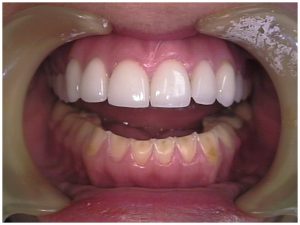Spotting Bulimia
 We often think of bulimia as “that eating thing models get.” But this isn’t the case. Bulimia is a disorder than can manifest itself in anyone and typically strikes teenaged girls. The victims don’t have to appear thin either, although many do.
We often think of bulimia as “that eating thing models get.” But this isn’t the case. Bulimia is a disorder than can manifest itself in anyone and typically strikes teenaged girls. The victims don’t have to appear thin either, although many do.
Common signs of bulimia
The easiest way to spot a bulimic is in both their patterns of eating and how they get rid of calories they’ve consumed. Unlike someone who is only anorexic, bulimics do eat and sometimes eat a great deal. But then they feel guilty and determined to lose the calories they’ve consumed so they remain “weight neutral.” This leads to binge eating and then purging.
The classic way they do this is by vomiting after a meal, so a pattern of eating a huge meal and then throwing it up again is a certain tip off. A bulimic may feel a compulsion to purge shortly after eating (before food has a chance to be absorbed) and running off to purge is certainly a tip off. Some will brush their teeth or use mouthwash to conceal the smell of vomit. Others might return from a purge visit to the restroom with a strong gum or mint in their mouths – none of these behaviors is normal.
Someone who vomits regularly will often show signs of acid damage to their teeth. The strong stomach acid will eventually erode the enamel on teeth.
Other signs of bulimia
Other signs are fasting on a regular basis or maintaining what appears to be a very strict diet. Some bulimics will eat (and purge) in secret, so finding odd food items or wrappers might be the only evidence.
Laxatives are sometimes used to move foodstuffs through the digestive tract as quickly as possible. Chronic laxative use is one sign there might be a problem. Laxatives are meant for short term relief only, so someone who purchases the “jumbo” box or uses laxatives regularly may have a problem.
Another way to burn excess calories bulimics use is to exercise an extreme amount. This goes beyond healthy exercise and into an obsession. Along with this, they may be overly concerned with their body image and complain about their weight even when it is normal or slightly less than normal.
The best way to spot a bulimic is to have them admit they have a problem with eating. Many will deny it, but a trusted relationship can get past this barrier. At some point, they will have to come to terms with their problem, and admitting it is a key step.
 Eating Disorder Self Test. Take the EAT-26 self test to see if you might have eating disorder symptoms that might require professional evaluation. All answers are confidential.
Eating Disorder Self Test. Take the EAT-26 self test to see if you might have eating disorder symptoms that might require professional evaluation. All answers are confidential.